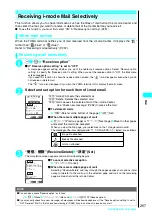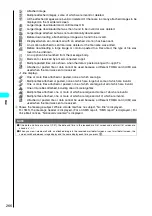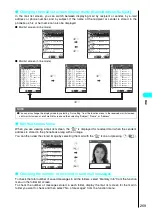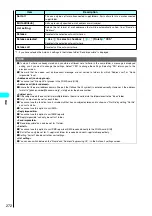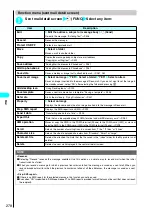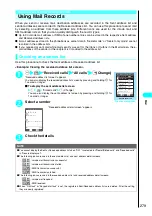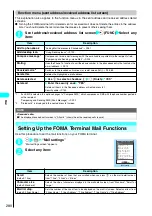
267
Continued on next page
Guide to the mail detail screens
The following is a guide to the conventions used in the mail detail screens.
①
Shows the mail status. (See the explanation for item
①
in the mail
list screen on P.265.)
②
Shows the time and date of transmission (time and date of arrival at
the Center).
③
Shows the sending type of received mail.
: Received mail addressed specifically to the recipient by the
sender.
: Received mail broadcast by the sender.
: Received mail broadcast by the sender with the other
recipients not shown.
④
Emotion-expressing mail icon that indicates characteristics of the
received message
(e.g.)
: Emotion-expressing mail icons
→
P.255
⑤
Shows received mail with the sender’s e-mail address.
:Sender’s e-mail address
:E-mail address to which replies cannot be sent (shown when
the e-mail address exceeds 50 half-pitch characters, etc.)
⑥
Shows sent mail with the recipient’s address and recipient type.
Use this to check whether the message was sent successfully. If the
message was sent to multiple recipients, all the recipients are
shown.
:Recipient to which mail was successfully sent.
:Recipient to which mail was not successfully sent.
:Recipient to which broadcast mail was successfully sent.
:Recipient to which broadcast mail was not successfully sent.
: Broadcast mail that was set up not to display the addresses of other recipients was sent
successfully.
: Broadcast mail that was set up not to display the addresses of other recipients was not
sent successfully.
⑦
Shows received mail with multiple recipient addresses specified (not including the current FOMA
terminal user). Up to 4 recipients can be shown.
: The sender addressed the message specifically to the recipient.
: An e-mail address to which replies cannot be sent to which the sender specifically
addressed the message.
: The sender sent a copy of a message to the recipient as broadcast mail.
: An e-mail address to which replies cannot be sent to which the sender sent a copy of the
message as broadcast mail.
The “
”, “
” or “
” icons are used to indicate an e-mail address to which replies
cannot be sent.
If the sender of received mail or the recipient of sent mail is stored in the phonebook, the “Name”
stored in the phonebook appears in fields
⑤
,
⑥
and
⑦
.
To display the name, the other party’s e-mail address must be stored correctly in the phonebook.
→
P.97
⑧
Shows the message subject. Where there is no subject, “No title” is displayed. For received SMS, “
”
is displayed (“
” if the SMS is in the FOMA card (UIM)) and “SMS” is displayed as the title (or “SMS
report” for SMS reports). When an SMS report has been received, the “
” icon is also displayed.
⑨
When a message includes attached or pasted files, this shows the icon, file name and file size (in
bytes).
: Pasted melody. If the pasted melody file is faulty, it is displayed as text in the message.
: Multiple pasted files. Also displayed when a file is pasted along with i-
α
ppli To.
: An i-motion attached to sent mail was deleted or the file name was edited.
−−−−END−−−−
melody
Received mail detail
2005/10/ 3 10:35
SugimotoMikiko
Thanks
Thanks for helping me ye
sterday until late.
Recv. mail 1/15
Select
Reply
FUNC
NakanishiTetsuya
melody
2KByte
7
8
0
!
9
3
4
1
2
5
Function menu P.277
−−−−END−−−−
2
6
8
0
1
!
Sent mail detail
2005/10/ 3 10:40
SugimotoMikiko
NakanishiTetsuya
Thanks
I hope to see you again
in the near future.
Sent mail 6/15
FUNC
090XXXXXXXX
Select
Function menu P.278
Summary of Contents for N901iS
Page 78: ......
Page 96: ......
Page 140: ......
Page 190: ......
Page 322: ......
Page 416: ......
Page 468: ......
Page 563: ...561 Appendix Memo ...
Page 564: ...562 Appendix Memo ...
Page 565: ... Quick Search Index Quick Manual ...





